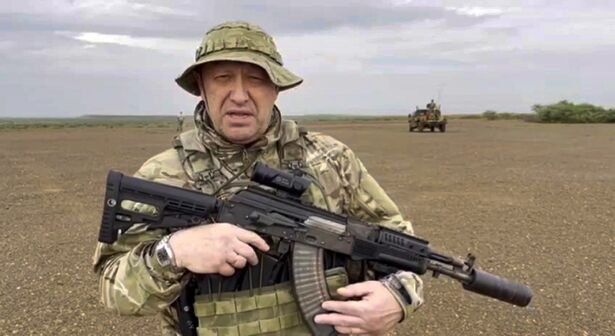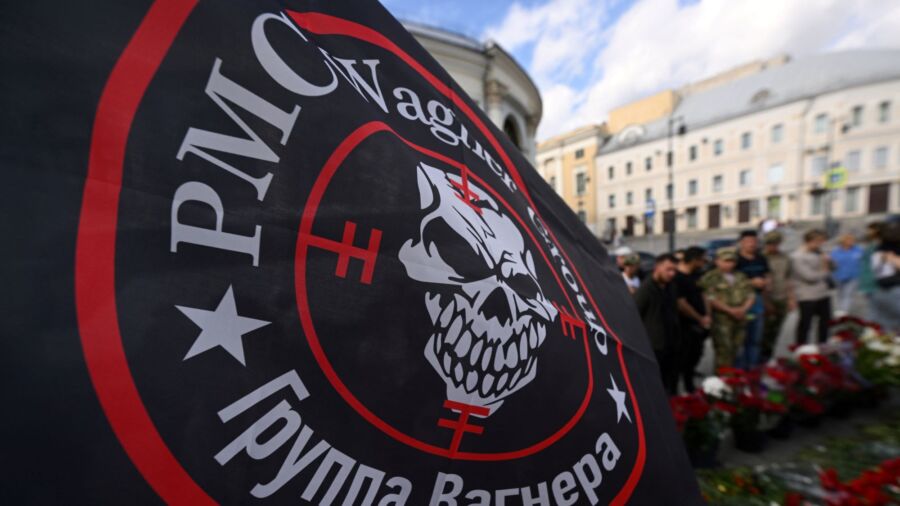Defence Secretary Grant Shapps has said the Russian mercenary group Wagner is to be proscribed as a terrorist organisation by the British government.
A draft order is being laid before Parliament on Wednesday but Mr. Shapps, who only took over the job from Ben Wallace last week, defended the delay in banning Wagner, whose founder and boss Yevgeny Prigozhin died in a suspicious plane crash last month.
Wagner has been heavily involved in the Russian invasion of Ukraine, which began in February 2022, and is alleged to have committed numerous territories in the occupied territories.
Explaining the delay in outlawing Wagner, Mr. Shapps told Times Radio: “One of the reasons, of course, is we have a democratic system, we have to declassify information in order to be to take these issues, to make them robust in front of courts.”
“There is a process you have to follow to do those things,” he added.
Once the order is passed by Parliament, it will become illegal to be a member of the Wagner Group or to support it financially or in other ways and those found guilty could face up to 14 years in jail.
It will also allow for Wagner’s assets to be categorised as terrorist property and seized.
Mr. Shapps told LBC, “Essentially it means that you can no longer or will no longer be able to be a part of that group in the UK because they will be deemed as a terrorist organisation so you wouldn’t be able to belong to it, you wouldn’t be able to use their insignias or logos.”
Shapps: Wagner has had ‘Devastating Impact’
“We’ve seen how Wagner operates. Obviously, we’ve seen the devastating impact they’ve had or tried to have in Ukraine, but they also operate in Africa or across the Sahel.
“And we do not want to see that organisation here. Prescribing them means that becomes illegal once Parliament passes it,” Mr. Shapps added.
Wagner has been heavily involved in the fighting in Sudan—which broke out in April—and has backed Mohamed Hamdan Dagalo and the paramilitary Rapid Support Forces against the Sudanese regular army.
It is also present in the Central African Republic—which has been riven by ethnic and religious civil war—and has emerged as a key player in Niger, where a coup last month deposed the pro-French leader, President Mohamed Barzoum.
Home Secretary Suella Braverman said Wagner was a “violent and destructive organisation” and its, “continuing destabilising activities only continue to serve the Kremlin’s political goals.”

Relations between Prigozhin and the Russian military high command deteriorated rapidly earlier this year, with the Wagner boss accusing them of failing to provide enough equipment and ammunition for him to take on the Ukrainian enemy.
In June, Prigozhin led Wagner forces into the Russian city of Rostov and then tried to march on Moscow in what was seen as an attempted coup against President Vladimir Putin.
He then agreed to go into exile in Belarus but was killed in a plane crash last month, sparking suspicions that the plane had been shot down by a Russian missile.
Is UK Government Position on Wagner and IRGC ‘Hypocrisy’?
The decision to outlaw Wagner has raised questions about why the British government has not proscribed the Iranian Revolutionary Guard Corps (IRGC), which has been accused of supporting terrorists in Lebanon, Syria and elsewhere in the Middle East.
In January, after the IRGC executed British national Alireza Akbari for allegedly spying for Britain, Catherine Perez-Shakdam, a research fellow at the Henry Jackson Society and an expert on Iran, accused the British government of “weakness” for not immediately proscribing the IRGC.
On Wednesday, Ms. Perez-Shakdam accused the UK government of “hypocrisy” and told The Epoch Times: “The UK will not proscribe the IRGC even though state officials keep talking about it. If they wanted to, they would have. Instead, they are blaming an ephemeral ‘they’ to divest themselves of guilt and responsibility.”
She said: “Wagner has worked with the IRGC and operates on the same model, so logic would dictate we proscribe the IRGC but we don’t. It means only one thing—that the UK is quite happy with the regime and willing to work with it.”
But Ranj Alaaldin, director of the Crisis Response Council, wrote on X, formerly known as Twitter: “Wagner joins a list that includes Hezbollah, Hamas and Boko Haram. This is significant on many levels and will have a bearing on the possible proscription of Iran’s IRGC, since the decision proscribes Wagner, which can be described as a state organ, under the Terrorism Act.”
He added: “Proscribing Wagner strengthens the case for proscribing the IRGC. Opponents of the move argue state organs do not fall within the Act’s ambit but if Wagner falls within its ambit then so does the IRGC. Wagner can be described as a pseudo-state organ, but so can the IRGC.”
PA Media contributed to this report.
From The Epoch Times

